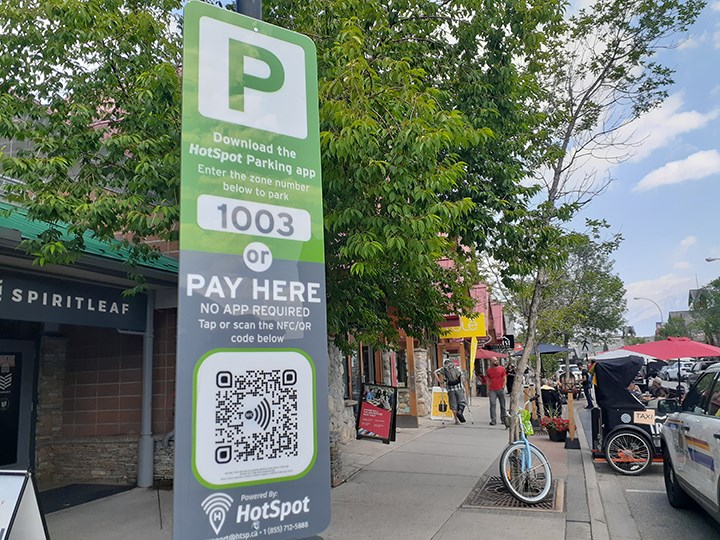
Jason Stockfish, Local Journalism Initiative Reporter | [email protected]
A resident exemption for paid parking will provide 500 credit hours for each registered resident vehicle to be used over the course of the 184 days of paid parking in Jasper.
Jasper Municipal Council voted in favour of this program during its Feb. 15 regular meeting.
The credit system requires residents to log their activity by tapping in and out using an app on their smartphones.
The main alternative to the credit system was a two-hour exemption, per parking session, which didn’t require the use of smartphones.
Before voicing his motion on the subject, Coun. Rico Damota asked CAO Bill Given to explain the merits of what administration had originally recommended—a recommendation Damota would later incorporate in his motion—that being, the two-hour exemption option.
“I’m about delivering the service with the least amount of headache possible,” Damota said.
“So, the question that I have is, considering both the two-hour free option and the 500-credit option, and strictly looking at it from administrating a service, which would provide the better service and best return financially for the community?”
Given explained that administration had determined the lowest level of customer friction would occur with a two-hour exemption for residents.
He noted that residents would not have to tap in and tap out using the app whenever they were parking in a paid stall downtown.
Rather, they would only have to ensure to abide by the two-hour limit and enforcement costs would be minimalized as a result.
The only interaction that administration would have with the two-hour exemption would be in the initial phase of helping residents to register.
The amount of revenue generated would also be reduced in this scenario, Given noted.
“With there being no limitations, you could park for an hour and a half in one spot and then move five feet down the road and then park for another hour and a half, so there really would not be any revenue-generating potential,” he added.
“(With) the preloaded credits system, administration really saw this as a middle-of-the-road approach.”
Given noted there would be the potential of revenue generation, but it was questionable if residents would use up 500 hours of free parking.
He added that in addition to the extra step for residents using the credit system, there is more education required and therefore an increased cost administratively under the credit system.
Ultimately, Damota’s motion to implement a two-hour exemption for residents was defeated 5-1, with Damota the only councillor in support.
Mayor Richard Ireland was absent from the vote.
After the defeat of Damota’s motion, Coun. Ralph Melnyk explained why his motion supports the 500-credit-hours option.
“The reason I suggested that 500 credits for residents was appropriate is that it gave residents, on average, 2.7 hours per day at their discretion for the 184 days that this would be operating,” Melnyk said.
“This allows residents to manage their parking. This allows (residents) to use the appropriate time for on-street parking, and then if they choose on another occasion to park for five hours, they could park in one of the lots, because there is no restriction as to the number of hours (in paid lots).”
“So, we’re giving the residents the maximum amount of flexibility,” Melnyk added.
Melnyk’s motion in favour of the 500 credit hours passed 5-1 with Damota voting against.
Before the motion passed, Coun. Helen Kelleher-Empey offered a friendly amendment, which Melnyk accepted, that administration address the concern of those who do not possess the technology required to log their parking by way of an app on a smartphone.
Also offering their support for the motion were councillors Scott Wilson, Kathleen Waxer and Wendy Hall.
Explaining that he sees flaws with both options, Wilson said he sees greater merit in the credit system as it shows the monetary potential of a parking stall.
“It teaches residents the value of parking, and it starts the conversation with residents,” he said.
“It gets them thinking, and it starts them in the program.”
Waxer emphasized that parking in the central business district was “a precious and finite commodity,” and she had no desire to impose new fees on residents.
“But, at the same time, I’m concerned about making it easier for residents to drive downtown in peak months when just maybe we should be incentivizing those residents who are able to walk, ride a bike, carpool or even skateboard downtown.”
Waxer further explained that the credit system would provide benefits to health and climate in addition to the monetary benefits for a municipality able to maximize vacant paid parking stalls.
Hall agreed with Waxer that it felt like they were making it too easy for residents to drive downtown.
“And I know there’s always exceptions, I know we all have to drive downtown at times, but I also want to make it really exciting and awesome for people to not drive downtown and to ride their bikes, and I think a credit system gives a lot more flexibility than two-hours per session.”
Paid parking will resume on May 1 and end on Oct. 31, when council will have the opportunity to review it for future years.



